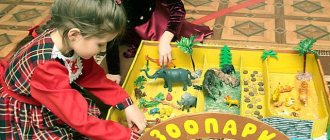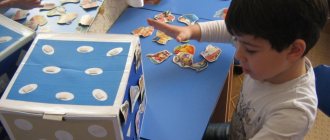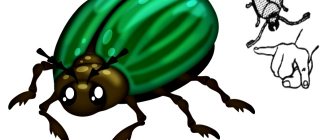Progress of the game.
The teacher, addressing the children, asks them questions, for example: “Remember what you can sew”
.
Children's answers . “Dress, coat, sundress, shirt, boots, fur coat, etc.”
.
"Darn?"
-
“Socks, stockings, mittens, scarf
.
“Should I tie it?”
-
“Shoelaces, rope, scarf, ties
.
“Push?”
-
“A cap, a scarf, a hat, a Panama hat, a peakless cap, a cap, a Budenovka
.
“Put it on?”
-
“Coat, dress, stockings, fur coat, raincoat, skirt, sundress, tights
.
The teacher names the words he has previously planned. Children give answers by choosing words that match their meaning.
"Make no mistake"
Purpose of the game . Develop quick thinking, consolidate children's knowledge of what they do at different times of the day.
Progress of the game.
Somewhere in a free space at one end of the yard or area there is a group of people playing . This is home. At a distance of several steps from the house - the farther the better - some kind of mark is placed and a line is drawn. This is a forest where different animals live. The hunter, one of the players, goes to this forest. Standing still, he says the following words: “I’m going into the forest to hunt, I’ll hunt for.”
Here he takes a step forward and says:
“.
hare" ; takes the second step:
".
bear" ; takes the third step:
".
wolf" ; fourth step:
".
fox" ;fifth:
".
badger." . With each step the hunter names an animal. You cannot name the same beast twice. You can’t name birds either, but if you play bird hunt, you only need to name birds.
The winner is the one who reaches the forest, naming a new animal with each step. The one who could not do this returns home, and the next one goes hunting. The unsuccessful hunter may be allowed to go hunting again. Perhaps this time the hunt will be successful.
Note. Based on the principle of this game , you can play the game “Fisherman”
.
The game is played in the same way. The fisherman says: “I’ll go fishing and catch it.
pike, crucian carp, perch,” etc.
"Come up with a proposal"
Purpose of the game . speech activity and quick thinking in
Progress of the game.
Children and teacher sit in a circle. The teacher explains the rules of the game : “Today we will come up with sentences. I will say a word, and you will quickly come up with a sentence with this word. For example, I will say the word "close"
and I’ll give Misha a pebble. He will take the pebble and quickly answer:
“I live close to the kindergarten
.
Then he will say his word and pass the pebble to the person sitting next to him.” The word in a sentence must be used in the form in which the person guessing suggests it. So, in turn (in a circle),
the pebble passes from one player to another. If children find it difficult to answer, the teacher helps them. This game is played after children have become familiar with the word and sentence.
"Say it differently"
Purpose of the game . Teach children to choose a synonym - a word that is close in meaning.
Progress of the game.
Children sit down so that they can put chips on the table. The teacher explains the rules of the game : “Children, now I will read you Korney Chukovsky’s poem “Confusion”
1. It will contain many fables. Try to notice and remember them. Whoever notices a fable by placing a chip will notice another fable - put a second chip next to it, etc. Whoever notices more fables will win. You can put down the chip only when you yourself have noticed the fable.”
First, a small part of this poem is read. The poem is read slowly, expressively, places with fables are emphasized. After reading, the teacher asks the children why the poem is called “Confusion”
.
Then the one who put aside fewer chips is asked to name the fables he noticed. Children who have more chips name those fables that the first responder did not notice. You cannot repeat what has been said. If the child has placed more chips than fables in the poem, the teacher tells him that he did not follow the rules of the game and asks him to be more attentive next time. Then the next part of the poem is read. It is necessary to ensure that children do not get tired, since the game requires a lot of mental effort. Noticing from the children's that they are tired, the teacher must stop the game. At the end of the game children who noticed more fables and explained them correctly
should be praised “What does anyone need?”
Purpose of the game . Exercise children in the classification of objects, the ability to name objects necessary for people of a certain profession.
Progress of the game.
Option 1. The teacher tells the children the rules of the game and explains the name. “Why is this game called that? Because you and I can answer the driver’s questions only with the words “yes”
or
not"
. The driver will go out the door, and we will agree on what object in our room we will wish for him. He will come and ask us where the item is, what it is, and what it is needed for. We will answer him with only two words. First, I will be the driver. When I leave the room, Vova will tell you what object he proposes to wish for. Then you will call me.
The teacher leaves, then enters the room and asks: “Is this object on the floor?”
-
"No"
.
"On the wall?"
-
"No"
.
"On the ceiling?"
-
"Yes"
.
"Glass?
Does it look like a pear?” -
"Yes"
.
"Bulb?"
-
"Yes"
.
Taking on the role of the first leader, the teacher teaches the children to ask questions logically. He explains: “Children, did you notice how I asked? First I found out where the object was, and then I found out what it was. Try to guess the same.”
This game teaches children to think logically : if an object is not on the floor, then it can be on the wall or ceiling. Children do not immediately draw the right conclusions. It happens: having learned that this object is not on the floor, the child continues to ask: “Table?”
,
"Chair?"
In such cases, the teacher helps the child come to the correct conclusion: “Ira, we told you that the object is not on the floor.
Where is the chair, the table?” - "On the floor"
.
“Should I have named them?”
-
"No"
.
“You found out that the object is on the wall. Look at the objects on the wall and guess what we wished for,” the teacher suggests. “Is it square?”
-
"Yes"
.
“Framed?”
-
"Yes"
.
“Does it have flowers on it?”
-
"Yes"
.
"Painting?"
-
"Yes"
.
Option 2. It is better to offer a more complex option. The teacher makes a guess for an object that is located outside the room: “Children, there are a lot of objects, and it will be difficult to guess if you don’t know whether it is on earth or in the sky, in the house or on the street, whether it is an animal or a plant.”
If children have played this game several times, they quickly begin to select questions and guess the intended object. For example, the children wished for the sun. Misha the guesser asks the following questions: “In the house? On the street? In the garden? In the forest? On the ground? In the sky?"
Having learned that an object is in the sky, 011 asks the following questions:
“Air?
Clouds? Snow? Sparrows? Rocket? Airplane? Sun?" Based on his questions, one can trace the course of logical thinking: having learned that an object is in the sky, he names only those objects that can be there.
“Who will notice more fables?”
Purpose of the game . Teach children to notice fables , illogical situations, and explain them; develop the ability to distinguish the real from the imagined.
Progress of the game.
The teacher conducts a conversation with the children, consolidating their knowledge about different parts of the day. Children remember what they do in the morning, afternoon, evening, night. Then the teacher offers a game: “Children, now let’s play with you like this. I will name one word, part of the day, and you will remember what you are doing at that time. For example, I will say the word "morning"
.
What do you name?” The children remember: “We wake up, say hello, wash, brush our teeth, comb our hair,”
etc. “That’s right,” says the teacher.
- But during the game, only the one to whom I place the cube will answer, and only one action can be named ( “I go to kindergarten”
or
“do gymnastics”
or
“work out”
); The person who calls passes the cube to another player. If someone does not remember and does not say anything, he must hit the cube on the table and pass it on. Then he is considered a loser. Be careful, don’t make a mistake!”
The teacher names different parts of the day, the children answer.
The same game can be played differently. the children's various actions , and they must answer with only one word: day, morning, night, evening. For example, the teacher says: “I’m having breakfast.”
, - and puts the cube to the player. He quickly answers:
“In the morning.”
Teacher:
“Watching TV.”
Children can name two words:
“Day”
,
“Evening
.
"Body"
Purpose of the game . Develop auditory attention; activate vocabulary, thinking; develop intelligence.
Progress of the game.
Before the game, the teacher conducts a short conversation, clarifying the children’s understanding of the words “profession”
,
“actions”
: “Children, I work as a teacher in a kindergarten.
This is my profession. Tolina’s mother treats the sick. Her profession is called "doctor"
.
What do you think is the profession of Antonina Vasilievna, who cooks dinner for us? (Children answer: “Cook
.”) Name what professions you know.
(Children call: “Driver, teacher, shoemaker, pilot, etc.”
) Each person, having a profession, works and performs some actions.
What does a cook do? (Children answer: “Cooks, bakes, fries, grinds meat, peels vegetables, etc.”
) Now we will play with you the game
“Who can name the most actions?”
I will name a profession, and you will remember all the actions of a person in this profession.”
The teacher says the word "doctor"
.Children answer: “Examines patients, listens, treats, gives medicine, gives injections, operations.”
“Tailor”
- bastes, cuts, flogs, irons, tries on, sews, etc.
The teacher names professions familiar to the children: janitor, nanny, laundress, driver, etc. Children remember what people in these professions do.
Whoever names the most actions is considered the winner.
"Not really"
Purpose of the game . Teach children to think , ask questions logically, and make correct conclusions.



